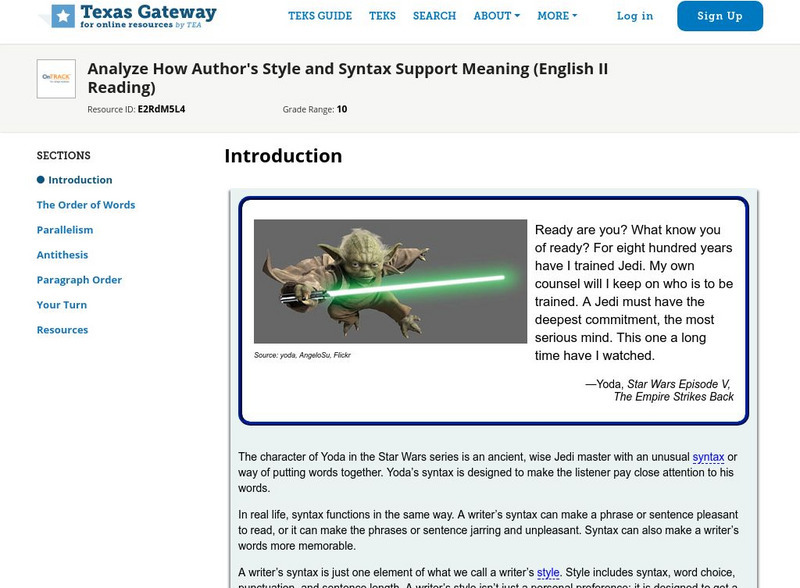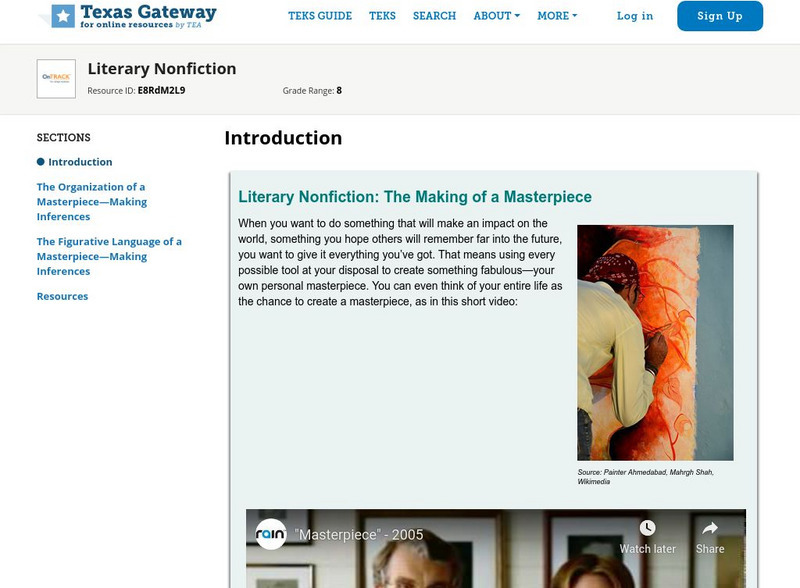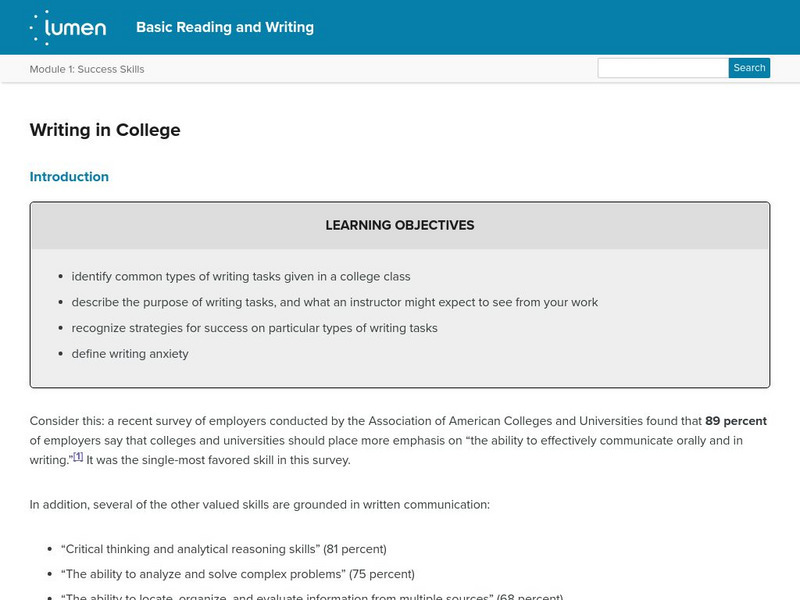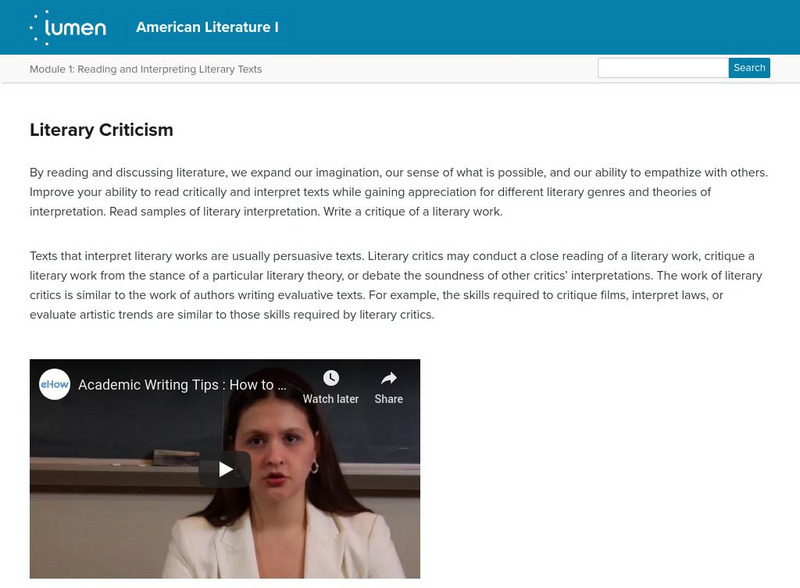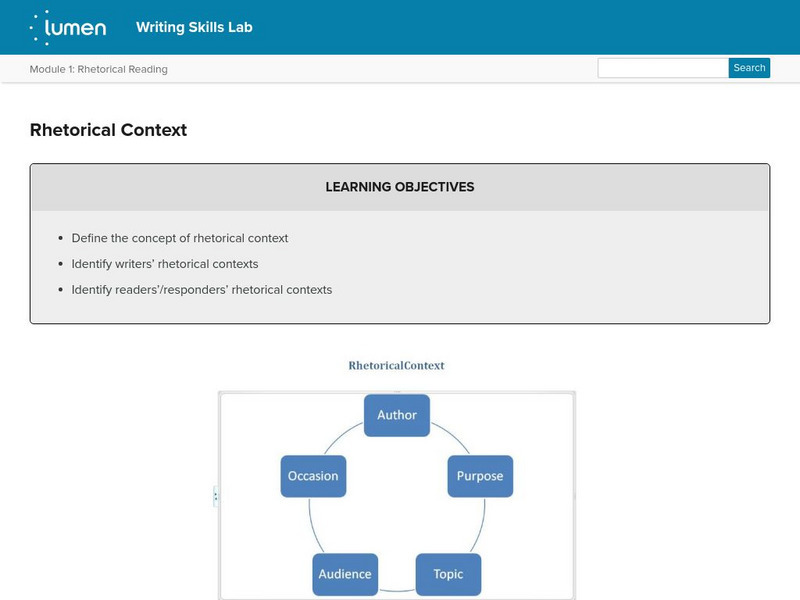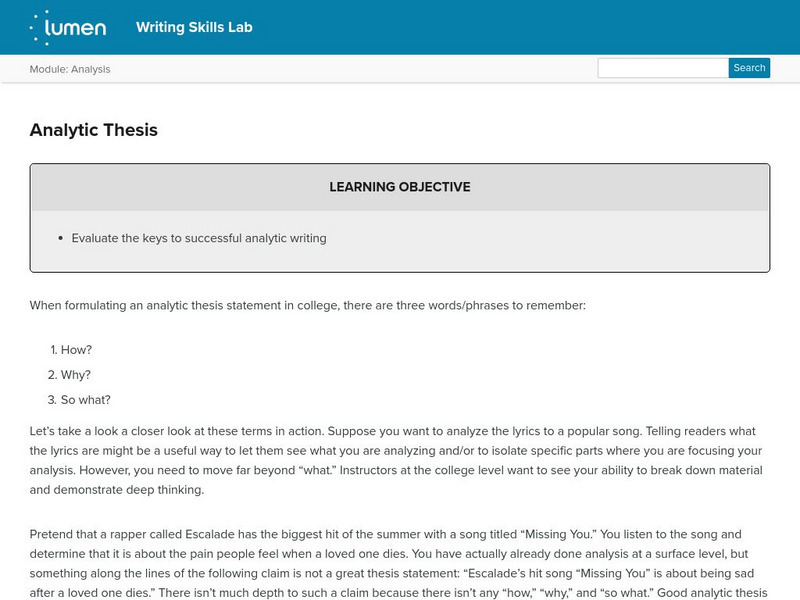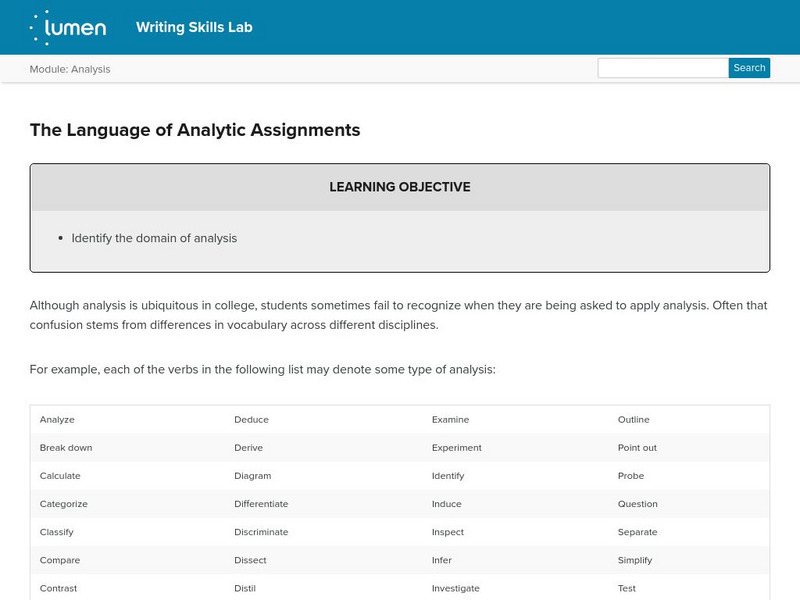ReadWriteThink
Read Write Think: Defining and Exploring an Author's Stylistic Choices
Contains plans for two lessons that teach students how to recognize an author's use of style in literature. These plans use "Their Eyes Were Watching God" by Zora Neale Hurston as an example, but the basic ideas can be adapted to other...
Sophia Learning
Sophia: The Impact of Rhetorical Devices
This slideshow focuses on the impact of rhetorical devices and how they impact text. It explains eight common rhetorical devices: anaphora, asyndeton, chiasmus, direct address, hyperbaton, parallelism, polysyndeton, and rhetorical...
Varsity Tutors
Varsity Tutors: Web English Teacher: Expository Writing
This Web English Teacher provides great links and resources for assistance, activities, and information about expository writing.
Tom Richey
Slide Share: Author's Purpose and Point of View
This downloadable slideshow focuses on how an author's purpose and point of view work together in fiction and nonfiction, and how to identify the point of view.
Texas Education Agency
Texas Gateway: Analyze Texts With Similar/different Purposes
[Accessible by TX Educators. Free Registration/Login Required] Make complex inferences and use textual evidence such as imagery and figurative language to support understanding.
Texas Education Agency
Texas Gateway: Analyze Point of View in Literary Texts/fiction
Identify and understand an author's choice of point of view, including limited versus omniscient and subjective versus objective.
Texas Education Agency
Texas Gateway: Analyze Shifts in Perspective in Informational/persuasive Text
[Accessible by TX Educators. Free Registration/Login Required] Explain shifts in perspectives in the same argument and make decisions about support used in those arguments.
Texas Education Agency
Texas Gateway: Analyze How Author's Style and Syntax Support Meaning
Analyze how an author's style and syntax support meaning in a text. RI.9-10.3 author unfolds. CCSS.ELA-Literacy.CCRA.L.3
Texas Education Agency
Texas Gateway: Analyze an Argument: Practice 1 (English Ii Reading)
Analyze the quality, relevance, and credibility of evidence that supports or opposes an argument.
Texas Education Agency
Texas Gateway: Development of Characters Through Literary Devices
Rcognize how literary devices such as character foils can create complex characters in a short story.
Texas Education Agency
Texas Gateway: Revising the Persuasive Essay: Purpose, Audience, and Context
[Accessible by TX Educators. Free Registration/Login Required] Learn strategies for evaluating and revising the organization of an essay, including purpose, audience, and context.
Texas Education Agency
Texas Gateway: Literary Nonfiction
Learn how to analyze literary nonfiction, particularly speeches, by making inferences and drawing conclusions based on evidence in the text.
Lumen Learning
Lumen: Success Skills: Writing in College
Although this lesson focuses on college writing, it fits perfectly into the high school curriculum without being too difficult to understand. It provides types of essay writing assignments and how to handle each, strategies for writing...
Lumen Learning
Lumen: Writing Process: Prewriting
This lesson focuses on prewriting including the purpose and characteristics of prewriting, prewriting strategies, the rhetorical context, and developing a working thesis statement. It also includes a slide show about author, audience,...
Lumen Learning
Lumen: Critical Reading: Conclusion to Critical Reading
This lesson focuses on the importance and purpose of reading. It features an article entitled "The Benefits of Leisure Reading."
Lumen Learning
Lumen: Reading and Interpreting Literary Texts: Literary Criticism
This activity focuses on how to write a literary criticism, the different theories and approaches to literary criticism, and their standard format.
Lumen Learning
Lumen: Rhetorical Reading: Rhetorical Context
This lesson focuses on rhetorical context including defining it, questions to ask to understand it, and how it can be useful to the reader and responder.
Lumen Learning
Lumen: Rhetorical Reading: Practice: Rhetorical Context
This is a practice activity to see if students can identify the writer's rhetorical context.
Lumen Learning
Lumen: Rhetorical Reading: Putting It Together: Rhetorical Reading
This is a summary of the previous lessons having to do with rhetorical reading including rhetorical context, previewing text, actively reading, using context clues, and reading voraciously.
Lumen Learning
Lumen: Analysis: Putting It Together: Analysis
This lesson plan focuses on analysis including an understanding of what analysis is, the keys to effective analysis, and the types of analytic assignments.
Lumen Learning
Lumen: Analysis: Analytic Thesis
This lesson focuses on the forming an analytic thesis statement that includes the how, why, and so what of the subject. It also discusses the need to let the thesis develop naturally and be sure that the main claim is reasoned.
Lumen Learning
Lumen: Analysis: The Language of Analytic Assignments
This lesson focuses on understanding the language of assignments that indicate the need or analysis including a list of verbs that denote the need for analysis and assignments that ask you how the parts relate to the whole, how something...
Lumen Learning
Lumen: Analysis: Rhetorical Analysis
This lesson focuses on defining rhetorical analysis and identifying and applying different types of analytic processes. It also provides a practice activity.
Lumen Learning
Lumen: Analysis: Process Analysis
This lesson focuses on process analysis including processes by people, machines, and nature. They can be classified as descriptive and prescriptive. It also includes a practice activity.







